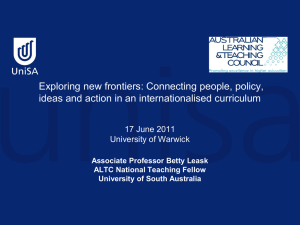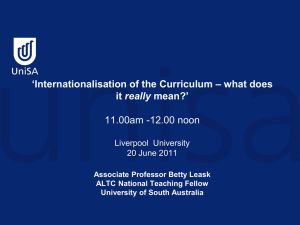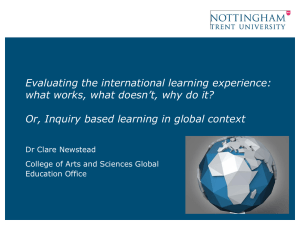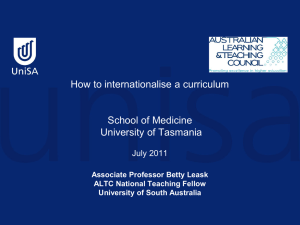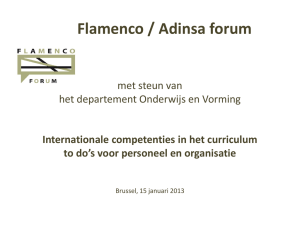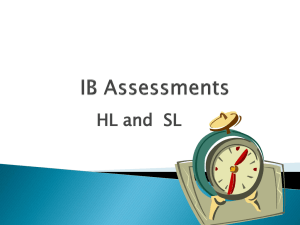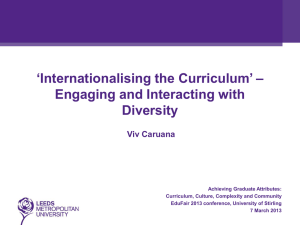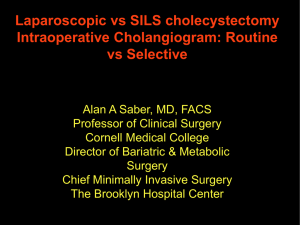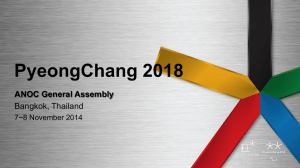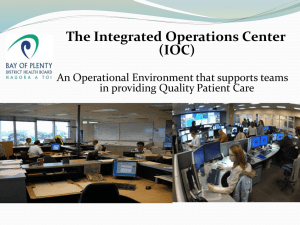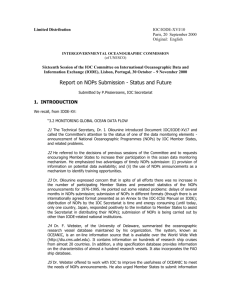Internationalisation of the accounting curriculum, RMIT
advertisement
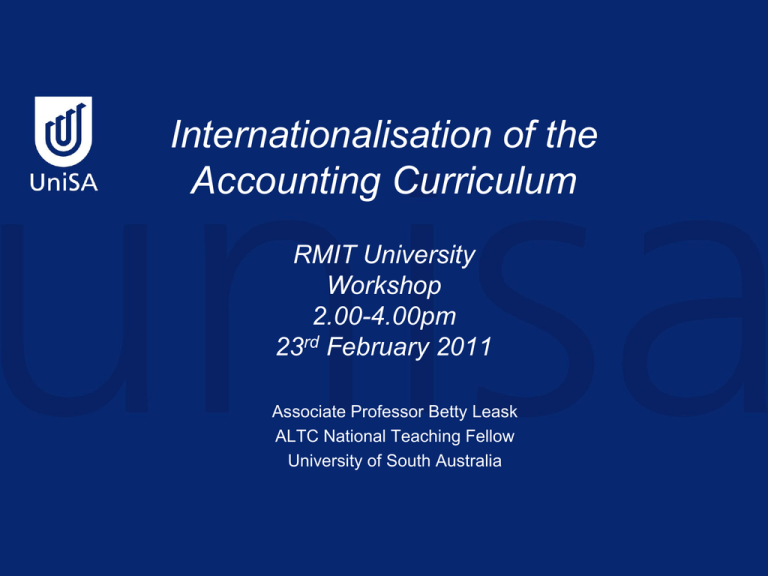
Internationalisation of the Accounting Curriculum RMIT University Workshop 2.00-4.00pm 23rd February 2011 Associate Professor Betty Leask ALTC National Teaching Fellow University of South Australia Workshop outline 1. What does IOC mean in general terms? 2. What are the main blockers and enablers of IOC? 3. What does it mean in Accounting? 4. Where to start? Discussion • Brainstorm as many features of an internationalised curriculum as you can in 2 minutes. • Record these Identifying questions... • What are some of the questions you have about IoC? What do we mean by ‘the curriculum’? The formal curriculum • the sequenced programme of teaching and learning activities and experiences organised around defined content areas, topics and resources, the objectives of which are assessed in various ways The informal curriculum • various extra-curricular activities and support services that help to define the culture of the campus They both shape the student experience • Together the formal and the informal curriculum shape the lived experience of the student – they simultaneously define present learning and create the capacity for further learning within an increasingly connected and globalised society • Both can assist students to develop greater awareness of their own and others cultural identities But the meaning of IOC is not always clear • ‘While the appeal of the idea of internationalization of the curriculum appears ubiquitous it is not always clear what it means and how it might represent a new way of prioritizing and organizing learning’ (Rizvi and Lingard 2010, p. 173) • IOC in the disciplines is poorly understood and has been a low priority in the past (Leask and Beelen 2010) It is described both as a process and a product • ‘internationalisation of the curriculum (IoC) refers to the process of developing a curriculum which is internationally oriented, aimed at preparing students for performing (professionally/socially) in an international and multicultural context, and designed for domestic students as well as foreign students (IDP, 1995) ... related to student learning • the incorporation of an international and intercultural dimension into the preparation, delivery and outcomes of a program of study (process) • An internationalised curriculum will purposefully develop all students’ international and intercultural perspectives - skills, knowledge and attitudes (product) (Leask 2010) ... related to development of graduate attributes • Most unis now have statements of generic graduate attributes. Most include: – communication skills – team work – international/global perspectives &/or citizenship • Employers value these skills • Difference between generic and disciplinespecific graduate attributes What will the ‘product’ look like in general terms? • An internationalised curriculum will engage students with cultural and linguistic diversity and purposefully develop their international and intercultural perspectives • There will be ‘a strong emphasis on carefully structured and designed interactive and collaborative learning processes’ (Van der Wende 2000, p.25). It’s about more than content and it has a discipline perspective • ‘internationalising curricula is not just about content, it also requires changes in pedagogy to encourage students to develop critical skills to understand forces shaping their discipline and challenge accepted viewpoints’ (Zimitat 2008) Academic staff have a critical role to play IAU survey 2005 and 2009 • 2005 - staff engagement ranked as #1 blocker • 2009 - financial issues #1 but staff engagement #2 But they need support ... • ‘...institutions need to focus far more on mobilising, training and providing support to faculty members and staff to build up internationalization knowledge and readiness if they are to reach their internationalisation goals’ IAU 3rd Global Survey Report, 2010, pp77-78 ‘IOC in Action’ An ALTC National Teaching Fellowship 2010-2011 ‘How can we internationalise the curriculum in this discipline area in this particular institutional context and ensure that, as a result, we improve the learning outcomes of all students?’ – – – – Themed ‘literature review’ Case studies of IoC in action- new & ‘old’ International networks Ideas and examples; issues and concerns • www.ioc.net.au Discussion • What, for you, are the main obstacles to internationalisation of the curriculum? • What, for you, would be key enablers of internationalisation of the curriculum? IOC in Accounting: A quick review of some of the literature Cobbin and Lee 2002 • ‘A micro-level approach to internationalising the accounting curriculum’ • In Journal of Studies in international Education • Describes a curriculum analysis technique applied to all UG accounting subjects at Uni Melb and resulting extension of internationalisation strategies Cobbin and Lee 2002: summary • Accounting ideally suited to internationalisation as operates internationally but also has strong local characteristics • Many graduates will be employed in international jurisdictions or work for Australiabased branches of international organisation • Over 30 years of literature in the area of internationalisation of accounting – but mostly out of US and UK. Little in Australia. • This study adopts ‘Burns Integration Model’ (1979) Cobbin and Lee 2002: summary Detailed audit undertaken to identify curricular elements which: • have universal application - is internationally relevant • are specific to Australia - not translatable to international context • are specific to the Australian context but international alternatives identifiable – transferable to an international context IoC = decisions re breadth and depth of coverage of issues and applications beyond Australia Cobbin and Lee 2002: summary • Recs made in different subjects are described: e.g. In Managerial Accounting: – Implement processes whereby a constant awareness and continual highlighting of the international character of the topic areas is introduced – Resources and teaching materials need to formally reflect the international character of the content – Use examples with a strong international perspective and illustrations drawn from international sources Cobbin and Lee 2002: conclusions • A ‘world dimension’ is important in accounting degrees • Need to clearly articulate international characteristics of the program with attention to ‘micro-level’ detail • IOC in accounting requires a commitment to a change in thinking and action on behalf of academic staff Lee and Bisman 2006 • ‘Curricula in introductory accounting: An international student focus’ • In Proceedings of the 3rd International Conference on Contemporary Business, Leura, NSW • Explores implications of increasing numbers of international students for accounting educators in Australia • Based on a survey of 21 unis plus analysis of subject outlines • Identifies a number of teaching and learning issues • Suggests some strategies to address these issues and improve quality of T&L for all students Issues identified • User’s vs preparer’s approach; conceptual vs technical approach – neither viewed as superior • Broad number (2-14) and range of objectives (25% included ‘communicate accounting information’) • Poor alignment between objectives, topic coverage and assessment items, especially in area of generic skills, in a number of unis. • e.g. no focus on teaching or assessment of group or communication skills despite related objectives McGowan and Potter 2008 • The implications of the Chinese learner for the internationalisation of the curriculum: An Australian perspective • In Critical Perspectives on Accounting19 • Identify some of the critical issues around internationalisation of the curriculum facing Accounting academics in Australian universities McGowan and Potter 2008 - summary • ‘tertiary students require international skills and competencies in the new global order’ (p.182) • ‘Curriculum internationalisation extends beyond international students and staff to a curriculum that is explicitly designed to develop intercultural competencies and international perspectives’ (p.183) • ‘the internationalised curriculum is often defined in terms of objectives for students’ (p.186) • ‘collegiality has been identified as an important factor that contributes to curriculum change and innovation’ (p.193) • ‘presence of international students ...should present a catalyst to genuinely internationalise the curriculum’ (p.194) but need to do this in the right way to avoid lowering standards Evans, Tindale, Cable, and Hamil Mead 2009 • ‘Collaborative teaching in a linguistically and culturally diverse higher education setting: a case study of a postgraduate accounting program’ • Report on an action research project around integration of development of professional communication skills into a conversion Masters program at Macquarie University • Published in HERD (A) Evans et al 2009 : Summary • Perception among academics that development of graduate attributes not their responsibility • Perception among some students that accountants ‘just work in an office and compute’ • Variations in conceptions of nature of generic GAs, their relationship to disciplinary learning and appropriate strategies to address their development • Particularly problematic in area of communication skills development for accounting professionals Evans et al 2009 : Summary • Not only international students who have difficulty with professional communication skills when entering accounting profession (Birrell 2006 report cited) • Accounting staff work collaboratively with English language specialists to integrate and assess communication skills of all students across the Macc program • MAcc students who had been through this program outperformed others in CPA exams – lower failure rate, more HDs and Ds Evans et al 2009 : Summary • Need to present development of professional communication skills as a key aspect of accounting programs • Then align objectives, teaching and assessment • Value was in discipline staff and language staff working together to adapt assessment criteria and focus on development of communication skills • Communication component worth 30% of some assessment tasks Evans et al 2009 : Conclusions • Linguistic and cultural diversity likely to increase not decrease – not only related to IS • Need to require, support and assess/assure development of professional communication skills as part of degree • Tweaking rather than major addition to content – still possible to cover technical skills • Program-level approach with changes at subject level- but not all subjects Discussion 1. What are the key features of an internationalised curriculum in Accounting? 2. How might you go about achieving these? Discussion 1. What international/intercultural perspectives/competencies do we want graduates of this degree to have when they graduate? 2. How will we develop these in each successive year of the degree? 3. How will we assess students’ progress towards achieving these internationalised outcomes? 4. How will we know our graduates have achieved them? 5. How can we support this through the informal curriculum? An example of IOC at the course level ACCT 1048 Corporate Accounting Successful completion of Corporate Accounting means that you should be able to identify, understand and apply accounting standards to a variety of practical situations. In addition the course provides an opportunity for you to develop generic capabilities. These include the ability to: • Analyse, reason logically and conceptualise issues • Identify, understand, apply and interpret accounting standards • Make judgements and decide on appropriate treatments • Clearly communicate analysis and reporting The course also aims to develop and improve your ability to effectively communicate financial information to users of the financial reports? – Including those from a variety of different linguistic and cultural backgrounds? The learning activities have been designed to...develop your ability to effectively communicate your learning in oral and written form – How and to what extent is this both taught and assessed? – How are teaching and marking staff supported to develop these skills in students? – How is this built on in other later year courses? Discussion 1. How important is the institutional vs the disciplinary context in relation to IOC? 2. How will your institutional context influence your approach to IOC in Accounting? Where to start? You’ll need to work as a team You can’t do it on your own Program teams need to consider 1. What international/intercultural perspectives/competencies do we want graduates of this degree to have when they graduate? 2. How will we develop these in each successive year of the degree? 3. How will we assess students’ progress towards achieving these internationalised outcomes? 4. How will we know our graduates have achieved them? 5. How can we support this through the informal curriculum? Other resources www.ioc.net.au • An audit tool and supporting resources • A themed literature review • An opportunity to participate in the ALTC fellowship as a case study (handout) References • • • • • • Cobbin, P. and Lee, R. (2002) A micro-level approach to internationalising the accounting curriculum. Journal of Studies in International Education, Vol. 6, No. 1, 59-77 Egron-Polak, E, & Hudson, R. (2010) Internationalization of Higher Education: Global Trends, Regional Perspectives IAU 3rd Global Survey Report Lee, C. and Bisman J. (2006)‘Curricula in introductory accounting: An international student focus’ Proceedings of the 3rd International Conference on Contemporary Business, Leura, NSW http://eprints.qut.edu.au Leask, B. (2009) Using formal and informal curricula to improve interactions between home and international students. Journal of Studies in International Education, Vol. 13, No. 2, 205-221 McGowan, S and Potter, L. (2008) ‘The implications of the Chinese learner for the internationalisation of the curriculum: An Australian perspective’ Critical Perspectives on Accounting19 (2008): 181-198 Rizvi, F. and Lingard B. 2010. Globalizing Education Policy Abingdon: Routledge.
